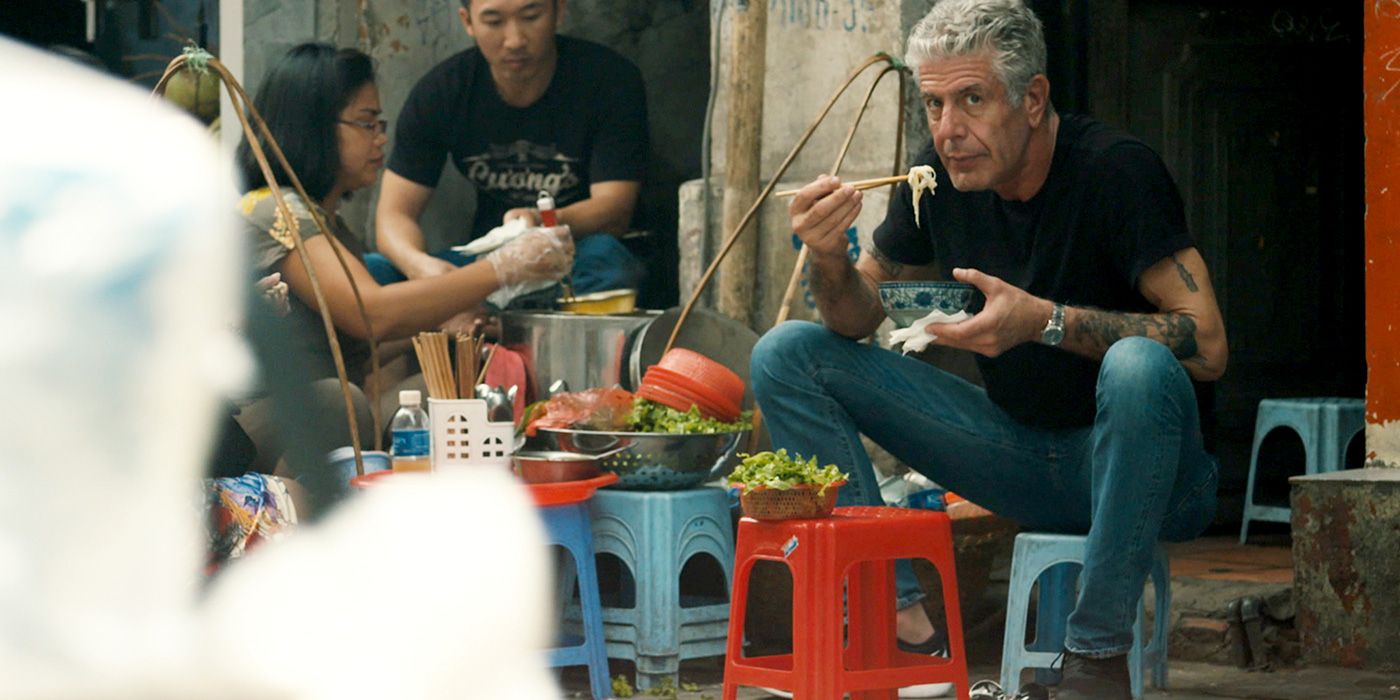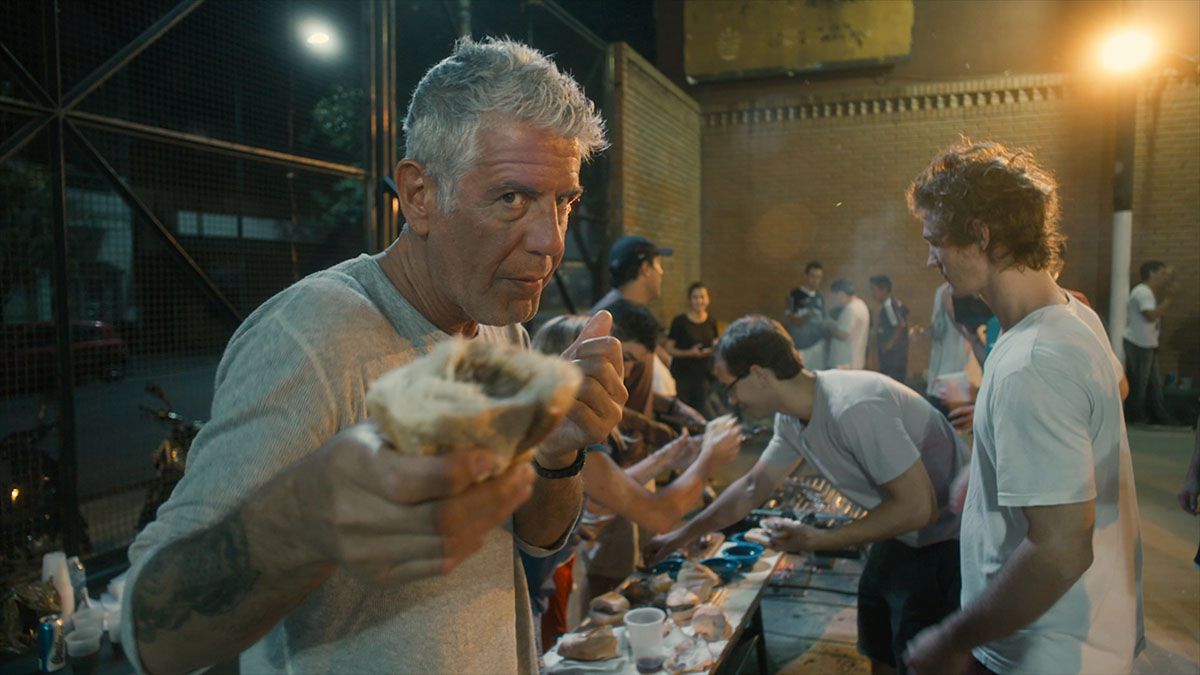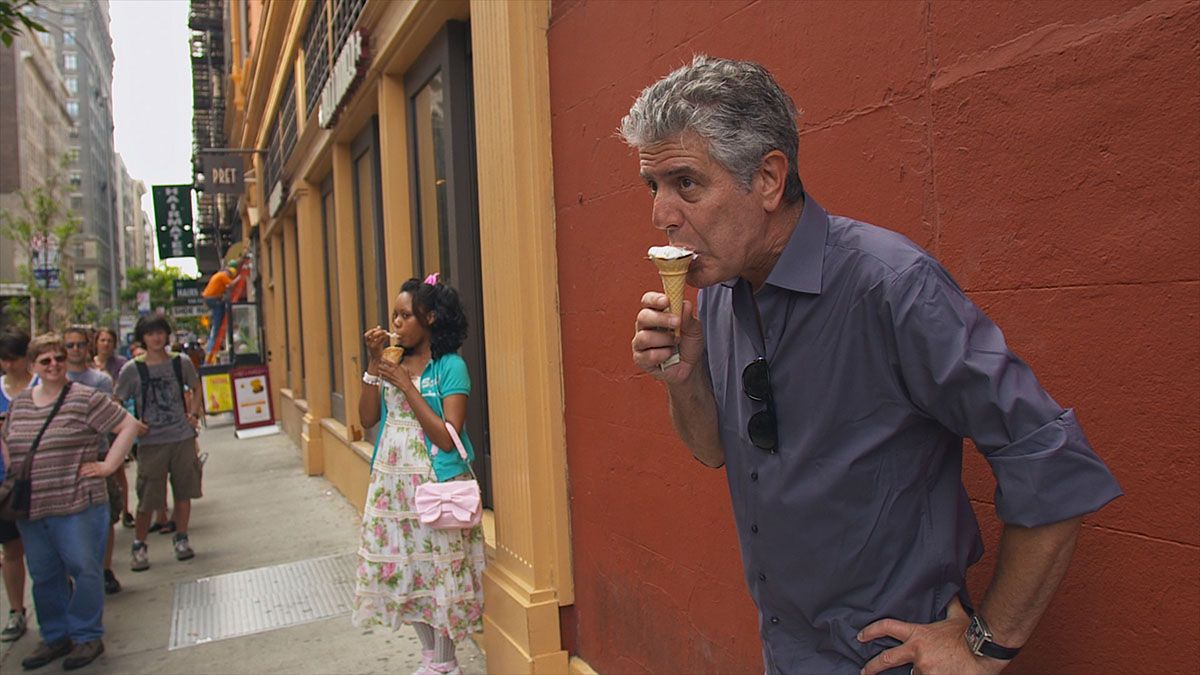The problem with a lot of mainstream entertainment is that it has a flattening effect. We like stories that have clear morals and lessons, heroes and villains, conflict and resolution. Anthony Bourdain’s travel TV shows—A Cook’s Tour, No Reservations, The Layover, and Parts Unknown—ultimately were supposed to impart the message that travel enriches the soul. To Bourdain’s credit, these shows sometimes went deeper, but networks and advertisers like pushing the notion that if we go around the world and interact with other cultures and places, then we will become better, more empathetic human beings with a greater appreciation for the majesty of life. So how does the host of that show end up committing suicide? Doesn’t that negate the “message” of these TV shows? Director Morgan Neville has a much harder task ahead of him with his new documentary Roadrunner: A Film About Anthony Bourdain than he did with his previous film, Won’t You Be My Neighbor? about the saintly Fred Rogers. Neville chooses to focus specifically on Bourdain’s meteoric rise from chef to author to travel host and what it meant to travel the world constantly. But as the movie nears its conclusion, Neville makes the horrendous mistake of trying to “answer” Bourdain’s suicide when there’s no answer to be found, nor would finding an answer make any difference. This decision casts a shadow over the rest of Roadrunner where the documentary no longer feels like an attempt to understand a complex individual, but rather an attempt from production company CNN Films to salvage a successful CNN show from a narrative it couldn’t handle.
Roadrunner begins with an interesting decision to basically skip the first 40-some-odd years of Bourdain’s life and start from his ascent at the publication of his memoir Kitchen Confidential. Perhaps Neville decided that with a documentary that’s already close to two hours it would be difficult to find space to cover those forty years, especially since Bourdain himself had done it in Kitchen Confidential, but it’s still curious to see the film start not at Bourdain’s personal story, but at the story of his fame. His success from Kitchen Confidential was parlayed into a travel show, A Cook’s Tour. After some initial unease with the format, playing host, and travel in general (Bourdain had never really traveled until these shows came along), Bourdain took to this new life of globetrotting and trying to find stories that went beyond simple headlines. And yet his own story defied easy explanation as his friends and coworkers describe a man who could be warm, funny, demanding, difficult, and pushed by an addictive personality that led him to extremes.
In its opening moments, Roadrunner admits the difficulty in doing a Bourdain documentary (even its subtitle “A Film About Anthony Bourdain” seems vaguely noncommittal, as if it were just one of many films about Bourdian) with footage of him saying that he doesn’t really want his death treated as anything special unless it’s something spectacular like being thrown in a woodchipper and sprayed into a restaurant. You can also see from the talking heads that Bourdain’s death is still raw for those who knew him, and it’s not an easy thing to talk about, which makes the documentary itself feel a little bit in bad taste. While the need to venerate Bourdain’s life and work is admirable, you’re also talking to people who haven’t even perhaps processed their own grief and asking them to unpack a loved one’s legacy.
The first half of the film manages to succeed in this endeavor because there’s far more comfort in talking about the good times in Bourdain’s life and simply glossing over anything controversial (for example, Bourdain became famous and simply started a “new phase” of his life, which meant divorcing his wife of 20 years, Nancy Putkoski, who is now a footnote in a history that the film doesn’t deem worthy of exploration). Neville is at his most successful in humanizing Bourdain by questioning his image and showing how he grew into his TV persona. It’s startling and encouraging to learn that Bourdain not only hadn’t traveled that much into well into his 40s, but also that he was fairly shy and not someone who could easily go out into the world. Writing was his gateway, and it wasn’t until his writing went hand-in-hand with his TV work did he finally crack the formula of what his show needed, and he could start coming out of his shell. As one his producers and friends notes, the sensational aspect of eating weird things “burned off” and what was left was Bourdain and a better show.
Roadrunner is clearly comfortable showing Bourdain between the highs of his TV series when he was creating something special, and the family life he had built with his second wife Ottavia Busia and their daughter, Ariane. It’s a nice picture to paint—the incisive TV show host going around the world to share important stories before coming home to live a portrait of domesticity where he’s at his happiest just grilling out by the pool. But as one friend notes, this was Bourdain “off track”, and when he got back “on track” for him that meant self-destruction, and it’s here where the film makes its worst set of decisions.
A suicide is not a crime to be solved. It’s a tragic circumstance going to the depths of another person’s psyche. You can’t reason it out because no reason will be satisfying. There’s no conclusion where you will get an audience to think, “Oh, well I guess suicide made sense in this regard.” It cannot comfort, and it cannot illuminate. And yet Neville attempts to reason out why Bourdain would take his own life as if that’s a question that needed to be answered beyond anyone’s morbid curiosity.
This leads Roadrunner down a deeply dark road where the film basically insinuates that Bourdain’s romance with actor and filmmaker Asia Argento was personally destructive to his well-being. If this is a film about Bourdain and his legacy, then why do we need scenes showing footage of an episode directed by Argento that Bourdain’s coworkers felt were not up to the standards they had set? Why do we need talking heads alluding to tabloids that say Argento was cheating on Bourdain and that drove him to despair and ultimately suicide because his personality operated at extremes? Even if you have one talking head say, “I don’t want to pin a man’s suicide on the woman in his life,” the fact that Roadrunner is even broaching that as a possibility is deeply gross and incredibly irresponsible.
Trying to deconstruct Bourdain’s death feels like a misguided attempt to demystify a complicated person whose identity was wrapped up in his contradictions. This isn’t Fred Rogers where you’re offered a through-line about the importance of kindness. Won’t You Be My Neighbor? gave Neville a TV personality he could handle because Mister Rogers Neighborhood was essentially “The Kindness Show Starring The Kindest Man Alive” and there wasn’t really anything to contradict that in Rogers’ life. Bourdain’s shows don’t offer those easy answers, and at times Roadrunner seems like it’s obscuring the nature of the production. Yes, Bourdain’s shows are about the awesome power of travel, but Roadrunner makes no mention about how these shows are on a production company’s dime and that the experience of a TV host, one who was already famous thanks to the success of his book and restaurant, is very different than the average person who’s thinking about going around the world. Neville is constantly forced to take the TV shows as an absolute good and work backwards from there rather than interrogating the nature of a travel TV show.
Roadrunner has a closing scene where one of Bourdain’s friends remarks how he sees murals of Bourdain and how Bourdain would hate such a sanitized, sanctified image. And yet Roadrunner is very much the equivalent of a cinematic mural of Bourdain. It has the same flattening effect that works against nuance in an attempt to find answers to questions that cannot be answered. There are some moments of insight, and it’s nice to have his loved ones sing the praises of a man who was widely admired, but in its worst moments, Roadrunner feels like a network’s spin for its valuable travel shows rather than an honest attempt to grapple with a difficult legacy.
Rating: C-




